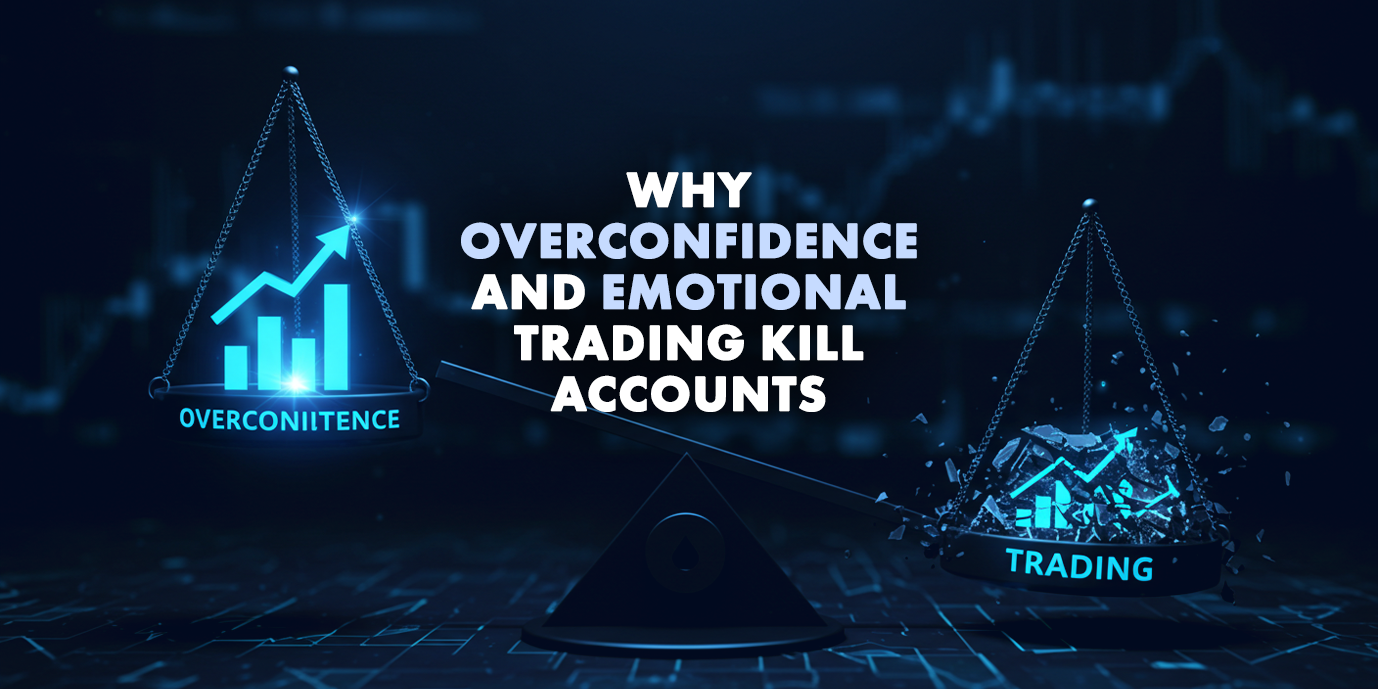How to Escape Emotional Trading Decisions: A Strategic Trading Plan for Traders
3/21/2025, 6:03:41 AM
Have you ever found yourself staring at the charts, second guessing your entries, chasing trades out of fear of missing out, or holding onto a losing position, hoping it will turn around? If so, you’re not alone.

Emotional trading is the number one reason why traders fail. It’s not a lack of knowledge or strategy - it’s the inability to follow a structured plan and make objective decisions under pressure.
Trading is a mental game as much as a technical one. Without a clear trading plan, emotions like fear, greed, and overconfidence take over, leading to overtrading, revenge trading, and erratic decision-making.
But here’s the good news: Emotional trading is preventable. By implementing a strategic plan, you can take control of your trading, eliminate impulsive decisions, and execute with confidence and consistency.
This blog will break down why most traders struggle with emotional decision-making and how you can build a structured trading plan that keeps emotions in check and sets you up for long-term success.
Why Traders Fail Without a Plan
Many traders believe they can rely on intuition, gut feeling, or quick reactions to navigate the markets. But data from behavioural finance tells a different story.
Traders who operate without a structured plan often:
Overtrade and take unnecessary risks.
Exit trades too early or hold on too long due to fear and greed.
Let emotions control decisions, leading to inconsistent performance.
Fail to track performance, making it impossible to improve.
In contrast, structured traders - those who follow a trading plan - outperform impulsive traders consistently. Your ability to succeed in trading is not just about strategy but about execution and discipline.
A Trading Plan is More Than Just a Document
Most traders think of a trading plan as something they write down once and forget. But a real trading plan is a living system that:
✅ Creates structure and clarity in your approach.
✅ Reduces emotional decision-making by defining clear rules.
✅ Provides measurable data to track your performance.
✅ Eliminates guesswork, making trading systematic rather than reactive.
Without a plan, you’re reacting to the markets instead of executing a structured process. And in trading, reactivity leads to failure.
The Key Components of a Winning Trading Plan

To break free from emotional trading, you must treat trading like a business - with a clear strategy, risk controls, and an execution plan.
1. Defined Risk Management Rules
Risk management is the foundation of any serious trading plan. Instead of thinking, “How much can I win?”, ask:
What’s my risk per trade?
What’s my max daily and weekly loss limit?
Do I have an emergency stop rule? (e.g., stop trading after two consecutive losses)
Am I adjusting risk based on market conditions?
A disciplined trader manages risk first - profits come later.
2. Clear Entry and Exit Criteria
Too many traders focus on finding the perfect entry but ignore exit strategies.
A professional trader has predefined exit criteria for:
Taking profits (e.g., fixed risk-reward ratios or trailing stops).
Cutting losses (e.g., strict stop-loss rules).
Scaling in or out of positions based on market behavior.
Without clear exit rules, traders become emotional - holding onto trades too long or exiting too soon.
3. Trade Management Plan
How will you adjust trades once you're in them?
Will you move stops to break-even at a certain profit level?
Will you scale in or out based on market movement?
How will you react to market news that affects your trade?
Successful traders predefine their adjustments rather than making emotional decisions in the moment.
4. Emotional and Psychological Management
Every trader experiences emotions, but your ability to manage them determines your success.
What’s your emotional trigger? (Fear of missing out, fear of losing, greed, overconfidence?)
Do you have a process to reset after a loss?
How do you maintain discipline after a winning streak?
A trading plan isn’t just about strategy - it’s about keeping emotions in check so they don’t dictate your decisions.
5. Tracking and Refining Your Plan
Your trading plan must evolve over time. The best way to improve is by tracking:
📊 Your win/loss rate and risk-reward ratios
📊 Common mistakes and emotional patterns
📊 How different market conditions affect your strategy
One of the most effective ways to improve is tracking at least 100 trades using a consistent approach. This allows you to analyze your data and refine your trading plan for long-term consistency.
Why Overconfidence and Emotional Trading Kill Accounts

Traders often struggle with two extremes:
1️⃣ Fear-based Trading – Hesitating to enter trades, exiting too early, or avoiding opportunities due to past losses.
2️⃣ Overconfidence – Entering too many trades after a winning streak, taking excessive risk, and thinking the market "owes" them money.
Both lead to account drawdowns and burnout. The solution? A trading plan that enforces discipline—so you follow rules, not emotions.
How to Implement a Sustainable Trading Plan Today
🚀 Step 1: Define Your Goals – What do you want to achieve in trading? (E.g., consistent 3-5% monthly returns)
📜 Step 2: Create Your Rules – Define your risk, entries, exits, and trade management plan.
📊 Step 3: Track Your Performance – Journal trades, review patterns, and refine your strategy.
🧠 Step 4: Manage Emotions – Set rules for handling fear, greed, and overconfidence.
⏳ Step 5: Commit to Long-Term Growth – Stick to a plan for 100 trades before making changes.
Your Next Move: Take Action

If you’ve been struggling with emotional trading, it’s time to stop gambling and start executing a real plan.
📌 Challenge for the Week:
👉 Commit to 100 structured trades using a clear trading plan.
👉 Track your emotions, mistakes, and improvements after each trade.
👉 Share in the comments how you’ll improve your trading discipline this week!
💡 Giveaway Alert! 💡 The winners of the 10K Challenge Account are : @BigsOfficial and @TevorOfficial
📌 Missed the Live Session? Watch it Here: https://www.youtube.com/live/a6aMFvL4MAk?feature=shared
Final Thought: Trading is a Business, Not a Hobby
If you approach trading like a professional - with a plan, discipline, and structure - your results will reflect that. If you treat it like a game, your account balance will suffer.
Your success in trading is not about how much you know, but how well you execute.
Commit to a plan. Stick to your rules. Remove emotions from trading.
🚀 Your next 100 trades could change everything. Will you take them with discipline? 🚀


